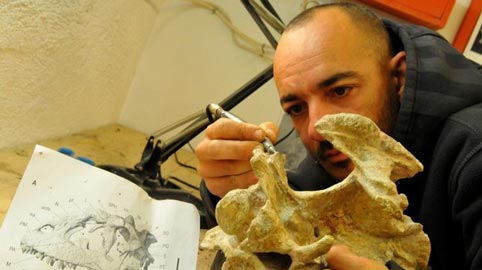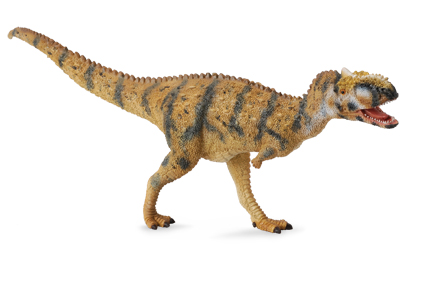New French Abelisaurid Named After Road Builder
Arcovenator escotae – Hunter from the Arc River Region of France
The Abelisauridae family tree just got a little bit bigger. A team of scientists from France have published a paper on a new abelisaur, this fossil discovery proves beyond reasonable doubt that these narrow-snouted, short-armed theropods were present in Europe at the very end of the Cretaceous. Say hello to Arcovenator escotae, which alongside the likes of Tarascosaurus* (T. salluvicus) becomes the second abelisaur to be known from France.
* The fragmentary nature of the fossil material ascribed to Tarascosaurus has led some scientists to question whether this dinosaur actually is a member of the Abelisauridae family.
Abelisaurid
In 2007, as a French construction company called Escota worked on an extension to the major trunk road, the A8, close to the city of Aix-en-Provence, (which itself is about twenty miles north of Marseilles), a series of fossil fragments were discovered in fluvial sandstones, all of which probably came from the same individual animal.
The fossil material consisted of elements from the back of the skull, a tail bone (caudal vertebra), bones from the lower right leg and three teeth. Importantly, the presence of cranial material, enabled the scientists including Thierry Tortosa (Museum of Natural History, Aix-en-Provence) in collaboration with Eric Buffetaut, one of the world’s leading experts on European dinosaurs, and the palaeontologist responsible for naming and describing Tarascosaurus, to positively identify the material as being from an abelisaur.
Arcovenator escotae
This new dinosaur has been named Arcovenator escotae, the name means “hunter from the River Arc”, the specific name honours the motorway construction company which delayed the building work until all the sediments and strata in the construction site had been properly mapped and explored.
Phylogenetic studies carried out by the French team suggest that this member of the Abelisauridae is more closely related to the taxa known from India and Madagascar than to South American forms of abelisaur. In addition, along with Tarascosaurus, Arcovenator is assigned a position in the Abelisauridae that indicates it is a basal, primitive member. The discovery of these fossils in Campanian aged strata (72-76 million years old), have led the scientists to propose that Africa and Europe may have played a significant role in abelisaurid dispersal, and not South America as previously thought.
Picture credit: Everything Dinosaur
At an estimated six metres in length, this theropod was very probably the apex predator in what was to become southern Europe at the end of the Cretaceous. It shared its environment with titanosaurs, ornithopods and a variety of mammals and birds, including several types of large flightless bird.
The scientific paper: “A new abelisaurid dinosaur from the Late Cretaceous of southern France: Palaeobiogeographical implications” by Thierry Tortosa, Eric Buffetaut, Nicolas Vialle, Yves Dutour, Eric Turini, Gilles Cheylan published in the Annales de Paléontologie.



